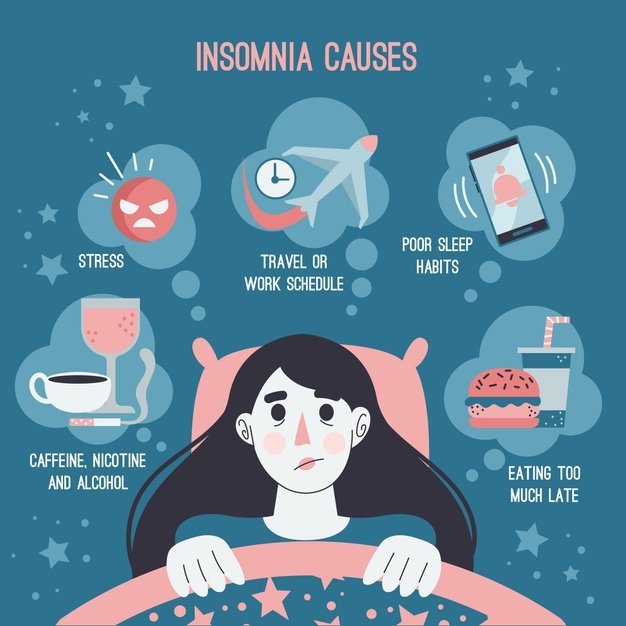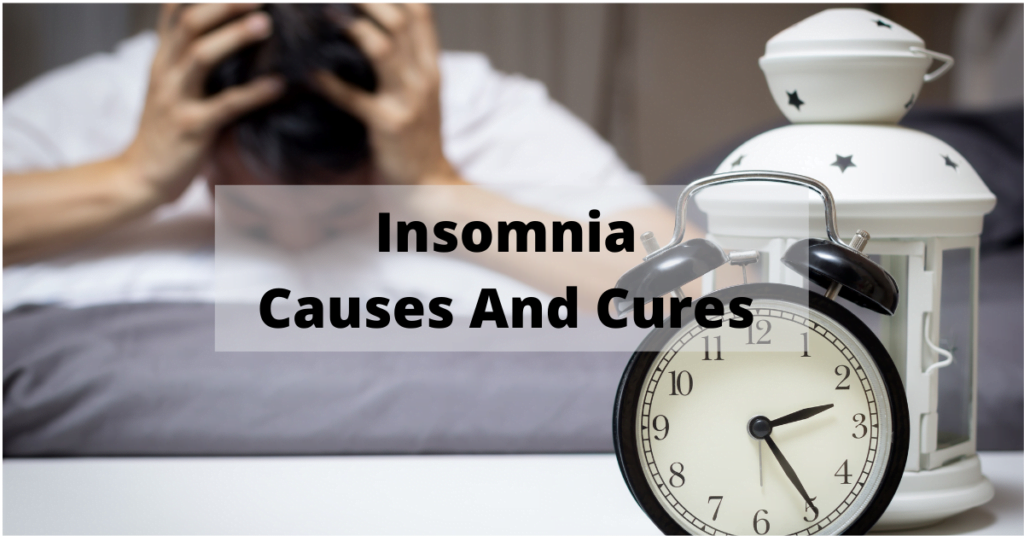Insomnia is a condition in which one has trouble sleeping. There are many different causes of insomnia, and there are many cures for it as well. In this article, we will discuss the most common causes and cures for insomnia so that you can find relief from your sleepless nights!
What Is Insomnia?
 Insomnia is a common sleep disorder that affects millions of people around the world. Losing out on enough sleep each night can cause fatigue, weight gain, and trouble concentrating at school or work—not to mention it can make you feel pretty grumpy! The good news is insomnia has plenty of causes and cures.
Insomnia is a common sleep disorder that affects millions of people around the world. Losing out on enough sleep each night can cause fatigue, weight gain, and trouble concentrating at school or work—not to mention it can make you feel pretty grumpy! The good news is insomnia has plenty of causes and cures.
Symptoms of Insomnia
These are some of the symptoms of insomnia:
- Tiredness during the day
- Difficulty concentrating and thinking clearly
- Lack of motivation or energy at school or work
- Not feeling refreshed after a night’s sleep
- trouble in relationships
- Difficulty falling asleep at night, including trouble getting to sleep and waking up during the night.
- Waking up too early in the morning.
- Daytime drowsiness and lack of energy.
- Behavior problems such as hyperactivity, irritability, mood swings, aggression, temper tantrums, or other behavior issues.
- Poor performance at school or work due to fatigue from poor sleeping patterns/insufficient restorative sleep.
Insomnia Causes and Cures
Insomnia is a disease that can be caused by many different things. Aiding to these causes, there are different cures.
Insomnia Causes

There are many causes of Insomnia. Some of these are:
Stress
Stress is one of the leading causes of insomnia. When you are stressed or anxious, it can be hard to find relief and relax your mind enough to fall asleep at night.
Environmental Factors
Some examples include noise disruptions from nearby traffic or construction work, an uncomfortable bedding environment that is too hot or cold, or simply being in a room where there is insufficient ventilation which may cause restlessness through lack of oxygen supply. There are also some people who have Seasonal Affective Disorder or SAD. This disorder causes individuals to sleep erratically during the winter months because of insufficient sunlight, which can cause insomnia.
Another environmental factor could be a room that has no natural light and therefore it’s always dark at night time causing difficulty in falling asleep.
Medical Conditions/Illnesses
This includes but is not limited to arthritis, chronic pain, heartburn, gastroesophageal reflux disease (GERD), asthma, dementia, depression, anxiety disorders including post-traumatic stress disorder (PTSD). Individuals who suffer from these illnesses often have trouble sleeping through the night due to their condition. Some medications taken for these diseases also act as stimulants and can cause difficulty in getting to sleep.
Sleep-Related Disorders
Sleep disorders such as sleep apnea, restless leg syndrome (RLS), and narcolepsy can disrupt a person’s ability to fall asleep or stay asleep.
Genetics/Family History
There is also a possibility of genetics playing a role in individuals developing insomnia, especially if their parents have trouble sleeping at night. There are different types of insomnia that children may inherit from their parents.
Medication Side-Effects
There are many different medications that can cause insomnia. Many anti-depressants, blood pressure drugs, and heartburn medication may all make it hard for a person to sleep well.
Sleep Apnea
Another common medical condition is called Sleep Apnea. This disorder causes people to stop breathing multiple times when they are sleeping which makes them wake up often throughout the night. If this continues long enough you will not get any restful sleep at all.
Electronics In Bed
Using electronics right before bed isn’t always a good idea because many of them emit blue light waves that tell your brain that it’s time to stay awake instead of relaxing into slumber mode. Wearing orange glasses or installing an app on a computer or phone can help ease the effects of blue light.
Lifestyle Choices
If there are certain things in life that contribute to poor sleeping habits then they will need to change if insomnia is going to go away completely. Smoking cigarettes before bed has been shown time and again from many studies as being one of the biggest causes of bad sleep quality, which contributes greatly to developing chronic insomnia.
Physical Exhaustion
Another big cause for insomnia is if your body feels exhausted but your mind isn’t ready to slow down yet. If this happens, it can make falling asleep very difficult even when you are physically tired. This comes from stress caused by daily life or exercise routines that are too rigorous which puts excess strain on an already fatigued body leaving them unable to relax into slumber mode at night time once again!
Insomnia Cures

Once you have figured out the source of your insomnia, it is time for a cure. There are many cures and remedies for those who have trouble falling asleep at night.
There are many different cures that exist and all work differently depending on the individual:
Behavioral Therapy/Sleep Hygiene
This includes positive habits such as avoiding caffeine late at night, having regular sleeping hours (the same bedtime and waking up the schedule every day), creating an inviting and restful environment conducive to sleep by using room-darkening shades or eye masks; creating a comfortable bedroom temperature around 67° F with comfy pillows and sheets; limiting light exposure from electronic devices before bed like TV or computers; not exercising right before going to bed because this will raise your body temperature and make it hard to cool down; avoiding eating before bedtime because this may disrupt sleep by causing indigestion or heartburn.
Medications
There are different medications that can be taken depending on the individual’s condition such as Ambien, Lunesta, Sonata, among others. However many of these medications cause you to get drowsy which will interfere with a person’s ability to wake up in the morning for work or school so they should not be used without consulting a doctor first. There is also a possibility of becoming dependent on sleeping pills due to prolonged use so they require careful monitoring from doctors when being prescribed medication for insomnia.
Cognitive Behavioral Therapy (CBT)
Cognitive Behavioral Therapy is a form of talk therapy that aims to help people recognize, understand, and change negative thinking and behavior. In this case, it can be done through self-help which consists of taking up relaxation exercises such as deep breathing or meditation, having a nightly routine before going to bed consisting of dimming the lights in your home about an hour before you plan to go to sleep; avoiding bright screens like TV’s or computers because they may interfere with melatonin production making it hard for some individuals to fall asleep.
Brainwave Entrainment Technique (BET)
This technique uses sound waves played into headphones. This is while listening to low volume levels during the daytime stimulating different parts of the brain simultaneously. It helps in promoting healthy mental function and relaxation.
Phototherapy/Light Therapy
This is when a person sits in front of light boxes for 30 minutes every morning. This is to help regulate their body’s internal clock and reset it. Doing this will also promote healthy normal sleep patterns at night. It is by sending signals from the retina or eyes. These tell your brain it is time to start producing melatonin. This helps people fall asleep easier. This technique is very effective according to some studies. Some have reported side effects such as headaches after sitting for long periods in bright lights so always consult a doctor before trying out phototherapy techniques if you suffer from insomnia.
Conclusion
Insomnia is a sleep disorder that can be a result of many reasons. It’s important to determine the cause of your insomnia and seek treatment for it in order to get relief from sleepless nights. There are several different types of treatments available, including prescription medications, relaxation techniques, cognitive behavioral therapy, herbal remedies, or supplements. If you suffer from chronic insomnia make sure to talk with your doctor about effective treatments before trying anything on your own.
For more information, please contact MantraCare. Sleep is an essential part of our daily routine and it plays a significant role in maintaining a healthy body and mind. If you have any queries regarding Online Insomnia Counseling experienced therapists at MantraCare can help: Book a trial therapy session


